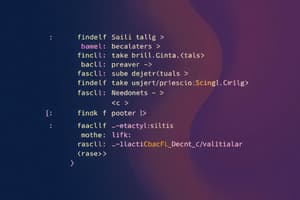Podcast
Questions and Answers
What will happen if a header file is included in a program twice?
What will happen if a header file is included in a program twice?
- Program will throw an error (correct)
- Program will throw an exception
- Program will run but with warnings
- Program will work without issues
Which of the following statements is true about static variables in C?
Which of the following statements is true about static variables in C?
- Can only be accessed in the local function scope
- It can be called from another function
- It exists even after the function ends (correct)
- It must be initialized every time the function is called
What will be the output of the following C code snippet that uses an array of structures?
What will be the output of the following C code snippet that uses an array of structures?
- Compile time error due to incorrect syntax
- No Compile time error, generates an array of structure of size 9
- No Compile time error, generates an array of structure of size 3 (correct)
- Runtime error due to memory allocation failure
How are strings represented in memory in C?
How are strings represented in memory in C?
Which of the following is true about the return type of functions in C?
Which of the following is true about the return type of functions in C?
Flashcards
Passing by value and reference in C
Passing by value and reference in C
In C, parameters are always passed by value. This means that a copy of the argument's value is created in the function's local memory space. Any changes made to the parameter inside the function do not affect the original argument's value in the calling function. However, pointers are passed by reference. This means that the function receives a copy of the memory address of the original argument. Any changes made to the pointer inside the function will directly affect the original argument's value in the calling function.
Static Variable in C
Static Variable in C
A static variable exists even after the function in which it is declared ends. It retains its value between function calls, making it useful for storing persistent data or counting function invocations. It can be accessed and modified only within the function it was declared in, but it cannot be passed as a parameter to another function.
How strings are represented in memory in C
How strings are represented in memory in C
In C, string literals are stored as arrays of characters. They are typically stored in a read-only section of memory, making them immutable. To modify a string literal, you would need to create a copy of it and modify the copy.
Default return type in C
Default return type in C
Signup and view all the flashcards
Study Notes
C Programming Study Notes
- Parameter Passing in C: Parameters in C are passed by value for non-pointer variables and by reference for pointers
- Multiple Variable Testing: Use logical operators (AND, OR, NOT) to test multiple values of a variable.
- Header File Inclusion: Including a header file more than once typically results in minimal impact for standards-compliant compilers; it won't generate an error by design but the extra inclusion may be redundant and cause problems in specific situations.
- While Loop Output: To determine outputs of while loops, trace the loop iterations by tracking variable changes within each nested iteration.
- Structure Array Output: When outputting an array of structures, consider the size of the structure and the number of elements in the array and how this may effect the generated output.
- Static Variable Properties: Static variables maintain their values across function calls because their memory persists even after the function ends. They can be accessed from other functions but must be modified with caution depending on the use case.
- Variable Scope and Lifetime: Understanding variable scope and lifetime is crucial when working with C; variables have specific areas of their code where they are used and these variables will be stored in memory.
- String Representation in Memory: Strings in C are represented as arrays of characters terminated by a null character ('\0').
- C Library Functions: Identify and use appropriate standard C libraries for specific tasks, such as using the
fgetslibrary function for line input and output when required. - Default Return Type: If a function's return type is unspecified, it defaults to
int. - Function Return Types: Functions in C can return any data types except arrays, functions, function pointers, or unions.
Studying That Suits You
Use AI to generate personalized quizzes and flashcards to suit your learning preferences.



